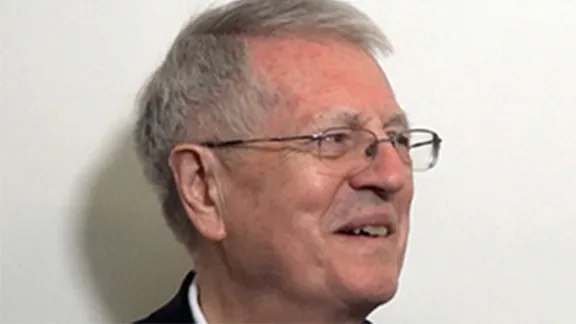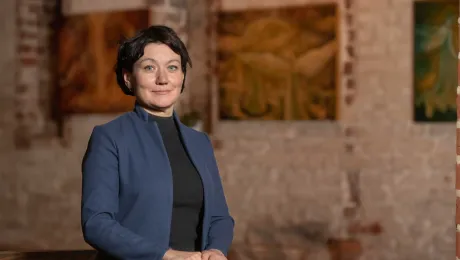
Rev. Dr William G. Rusch. Photo: Yale Divinity School
LWF gives thanks for the work and witness of Rev. Dr William Rusch, pastor of the Evangelical Lutheran Church of America
(LWI) - A man who “opened many doors” through his courageous and tireless commitment to the search for Christian unity. That is how the Lutheran World Federation (LWF) remembers the legacy of Rev. Dr William G. Rusch, pastor of the Evangelical Lutheran Church of America (ELCA), who passed away at the age of 87.
Prof. Dr Dirk Lange, LWF’s Assistant General Secretary for Ecumenical Relations, remembered Rusch as “a significant and prophetic ecumenical voice, for whom dialogue was not only doctrinal but also existential.” Lange noted that “he had many close friendships across the ecumenical world, including particularly close contacts with the Orthodox leader Ecumenical Patriarch Bartholomew.”
Dr William Rusch was a significant and prophetic ecumenical voice, for whom dialogue was not only doctrinal but also existential.
Prof. Dr Dirk Lange, LWF Assistant General Secretary for Ecumenical Relations
Dr Rusch was very active on the national scene in the United States, serving as a member of the Lutheran-Reformed, Lutheran-Episcopal and Lutheran-Roman Catholic dialogues there. He helped to establish the Lutheran-Orthodox dialogue in the United States which has played an important role in supporting the work of the International Lutheran-Orthodox Joint Commission on Theological Dialogue.
Dr. Rusch was also a long-time friend of the Institute for Ecumenical Research in Strasbourg and gave significant impulses in the preparation of the Joint Declaration on the Doctrine of Justification (JDDJ) signed by representatives of the Vatican’s Pontifical Council (now Dicastery) for Promoting Christian Unity and the Lutheran World Federation in Augsburg, Germany, on October 31, 1999.
Courage and concern for reception
Lange recalled that Rusch’s theological expertise and courage contributed significantly to many dialogue processes, consensus statements and, in the ELCA, full communion agreements. “His deep concern was reception,” Lange said, “to see that these processes, statements and agreements be implemented and that the churches ‘own the conclusions of their dialogues’. He was also tireless in his advocacy for the reception of the JDDJ.” That document, he stressed, was unique in that it was juridically affirmed by both signatories, “thereby serving as an example of what is and should be possible in ecumenical dialogue.”
Remembering Rusch as a teacher, Lange said that he “opened many doors with his commitment, his wisdom, his drive and his audacious hope. The LWF holds his family and his many students and friends in prayer, entrusting him to the loving embrace of God and giving thanks for his witness.”
Dr Rusch died on 16 January, just before the start of the annual Week of Prayer for Christian Unity. The World Council of Churches and the Vatican’s Dicastery for the Promotion of Christian Unity are among those who have paid tribute to his significant contribution to the global ecumenical movement.


